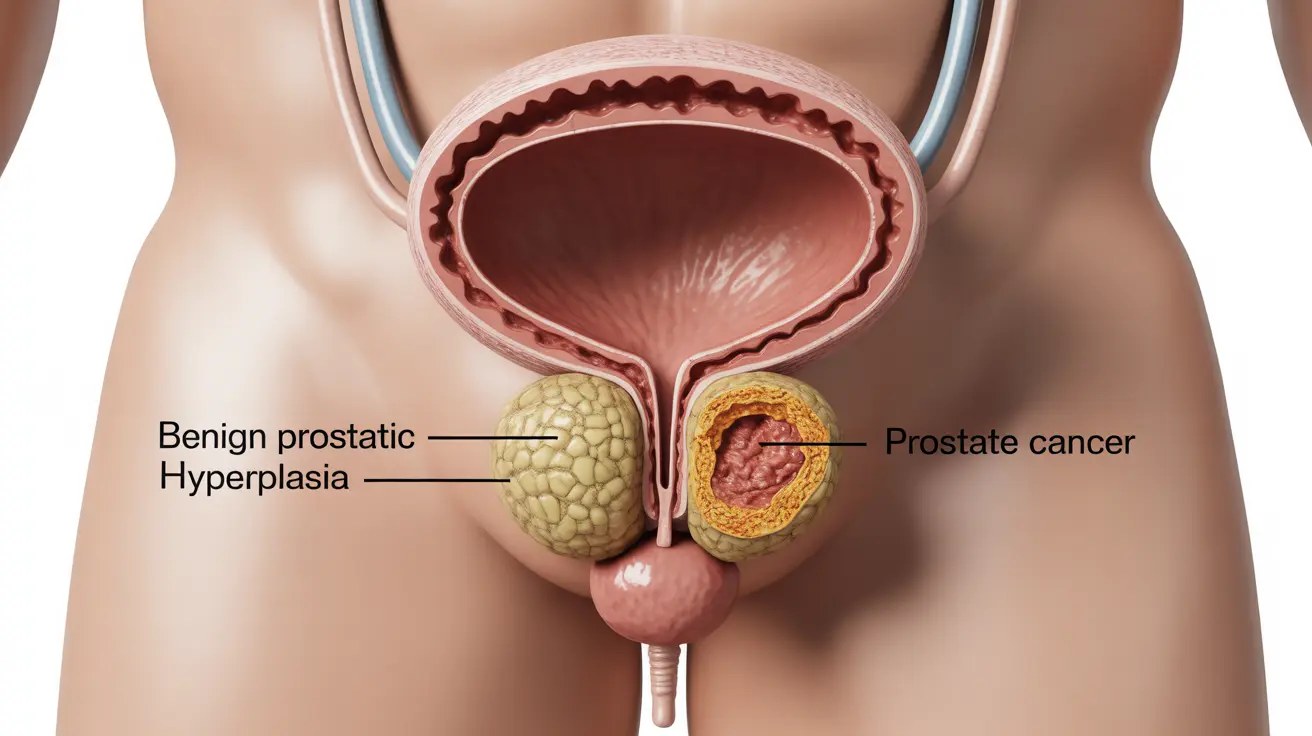For men experiencing prostate-related symptoms, understanding the distinction between benign prostatic hyperplasia (BPH) and prostate cancer is crucial for proper medical care and peace of mind. While both conditions can affect the prostate gland and cause similar symptoms, they are fundamentally different in their nature, progression, and treatment approaches.
This comprehensive guide will help you understand the key differences between BPH and prostate cancer, including symptoms, diagnosis methods, and treatment options. We'll also discuss when to seek medical attention and what to expect during the diagnostic process.
Understanding BPH and Prostate Cancer
BPH is a non-cancerous enlargement of the prostate gland that commonly occurs as men age. It's a natural part of aging for many men and doesn't increase cancer risk. Prostate cancer, on the other hand, is a malignant condition where cells in the prostate grow uncontrollably and can potentially spread to other parts of the body.
Key Differences in Symptoms
While BPH and prostate cancer can share some symptoms, there are important distinctions:
BPH Symptoms
- Frequent urination, especially at night
- Weak urine stream
- Difficulty starting urination
- Feeling of incomplete bladder emptying
- Urgent need to urinate
Prostate Cancer Symptoms
- Similar urinary symptoms to BPH
- Blood in urine or semen
- Erectile dysfunction
- Pain in hips, back, or pelvis
- Unexplained weight loss
Diagnostic Process
Healthcare providers use several methods to differentiate between BPH and prostate cancer:
Physical Examination
- Digital rectal exam (DRE)
- Assessment of medical history
- Discussion of symptoms
Laboratory Tests
- PSA (Prostate-Specific Antigen) blood test
- Urinalysis
- Additional blood work
Imaging and Specialized Tests
- Transrectal ultrasound
- MRI
- Prostate biopsy (if cancer is suspected)
Treatment Approaches
BPH Treatment Options
Treatment for BPH typically starts with lifestyle changes and may progress to medications or surgical interventions:
- Alpha-blockers
- 5-alpha reductase inhibitors
- Minimally invasive procedures
- Traditional surgery (in severe cases)
Prostate Cancer Treatment Options
Treatment for prostate cancer varies based on stage, grade, and individual factors:
- Active surveillance
- Radiation therapy
- Surgery (radical prostatectomy)
- Hormone therapy
- Chemotherapy
- Immunotherapy
Prevention and Risk Management
While you can't prevent either condition entirely, certain lifestyle choices may help manage risk factors:
- Maintaining a healthy diet
- Regular exercise
- Regular medical check-ups
- Managing stress levels
- Avoiding smoking and limiting alcohol
Frequently Asked Questions
What are the main differences between symptoms of benign prostatic hyperplasia (BPH) and prostate cancer?
While both conditions can cause urinary symptoms, BPH typically presents with gradual urinary changes like frequent urination and weak stream. Prostate cancer may additionally cause blood in urine or semen, bone pain, and unexplained weight loss.
How do doctors diagnose whether enlarged prostate symptoms are caused by BPH or prostate cancer?
Doctors use a combination of physical examination, PSA testing, and patient history. If cancer is suspected, additional tests like MRI and biopsy may be necessary. BPH diagnosis often relies more on symptom assessment and physical examination.
Can BPH lead to prostate cancer, or are these completely separate conditions?
BPH and prostate cancer are separate conditions. Having BPH does not increase your risk of developing prostate cancer. However, it's possible to have both conditions simultaneously, which is why proper medical evaluation is important.
What treatment options are available for BPH compared to prostate cancer?
BPH treatments focus on symptom management through medications or surgical procedures to reduce prostate size. Prostate cancer treatments are more extensive, potentially including surgery, radiation, hormone therapy, or chemotherapy, depending on the cancer's stage and grade.
When should I see a doctor if I have urinary symptoms that might indicate BPH or prostate cancer?
See a doctor if you experience persistent urinary symptoms, difficulty urinating, blood in urine or semen, unexplained pain, or weight loss. Early evaluation is crucial for proper diagnosis and treatment, regardless of the underlying cause.




